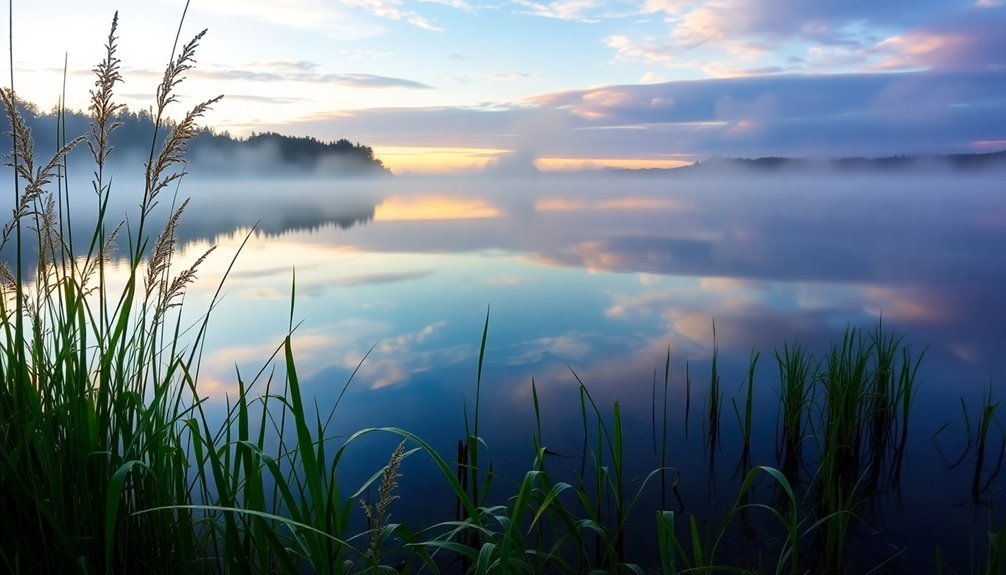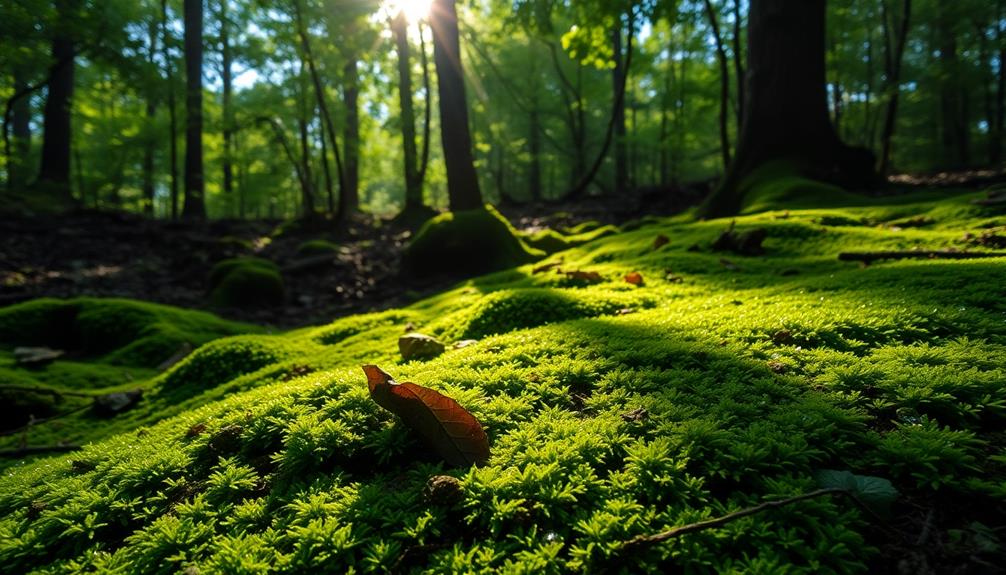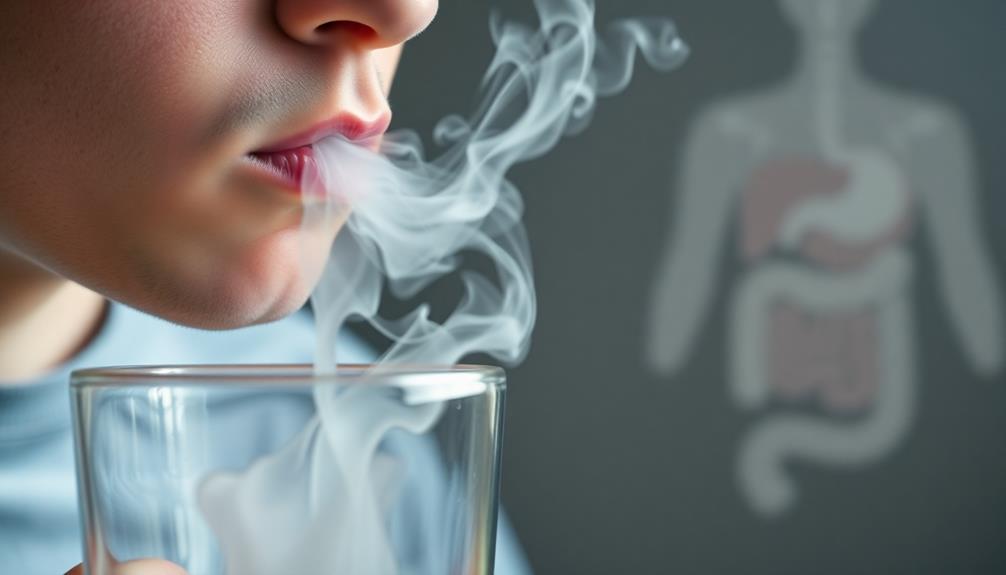When you're near a lake, you'll notice its scent changes with the seasons and local conditions. In summer, it might smell earthy and fresh due to algae blooms and decomposing plants. During the fall, you could detect a rotten egg smell from hydrogen sulfide released during water turnover. If the lake's shallow, it generally has a lighter aroma compared to deeper lakes, which can emit stronger, musty odors. The surrounding vegetation also adds unique notes. Each visit creates a distinct sensory experience, and there's so much more about lake aromas that might surprise you.
Key Takeaways
- Lakes can emit earthy and fresh scents during summer due to decomposition and algae blooms, reflecting biological activity.
- In fall, lakes may produce a distinct rotten egg smell from hydrogen sulfide released during turnover events.
- Odors vary between shallow and deep lakes, with deeper lakes often having stronger, unpleasant smells due to stratification.
- Rain events create a pleasant petrichor scent, resulting from chemical interactions between soil and water.
- Surrounding flora and industrial runoff can introduce additional scents that alter a lake's natural aroma.
Introduction

When you think of a lake, you might picture its serene waters and the surrounding landscape, but have you ever considered its smell? The aroma of a lake can be as dynamic as its ecosystem, changing with the seasons. In fall, for example, you may notice a distinct rotten egg odor due to the release of hydrogen sulfide during turnover. This process occurs when the warmer surface water mixes with the cooler depths, often bringing up organic materials that release various smells.
Lakes typically possess earthy and fresh scents, influenced by surrounding vegetation and the presence of algae. However, during periods of stratification, the different layers of water can produce varying odors. The hypolimnion layer, for instance, might emit foul smells due to low oxygen levels, signaling potential ecological issues.
Moreover, the pleasant smell of petrichor after summer rain can evoke memories of a nearby lake, showcasing how deeply intertwined our senses are with these natural landscapes. Ultimately, the specific odors you encounter at a lake serve as indicators of its ecological health, with strong, unpleasant smells often hinting at deeper problems within the aquatic ecosystem.
Description of the Smell
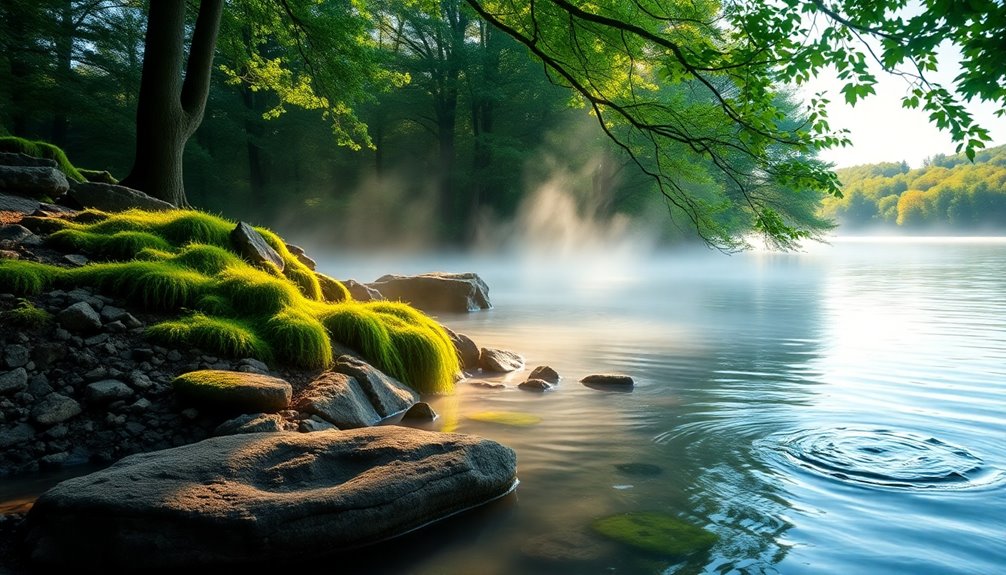
The smell of a lake can be both inviting and unsettling, often shifting with the changing seasons. During turnover events, you might catch a whiff of a distinct rotten egg aroma, a result of hydrogen sulfide being released as the water mixes. In the warm summer months, lakes emit earthy and fresh scents, thanks to the decomposition of organic materials and the blooms of algae. You may also notice a pleasant petrichor scent after rainfall, where soil and water chemicals mingle with moisture.
Surrounding vegetation plays a crucial role in shaping the overall aroma. The damp earth and wet leaves add a rich layer to the experience, enhancing the lake's natural fragrance. In shallow lakes, the smell tends to be less pronounced, while deeper lakes can produce stronger odors due to anoxic conditions that trap organic matter. These conditions can lead to more offensive smells, creating a unique olfactory experience that varies throughout the year. Each visit to the lake brings a new encounter with its distinct aroma, reminding you of the delicate balance of nature surrounding you.
Source and Composition

Understanding the source and composition of a lake's smell reveals the intricate interplay of various elements within the ecosystem. The distinct aroma you encounter often stems from organic matter, algae, and aquatic vegetation in the water. As these components decompose, they release gases that contribute to the lake's scent. For instance, during stratification and turnover events, hydrogen sulfide may emerge, giving off that unmistakable rotten egg odor.
The smell can change dramatically depending on the season. Warmer temperatures in late summer or fall enhance biological activity, intensifying the odors. You might notice earthy and musty notes particularly in shallow or nutrient-rich areas, where decomposing vegetation and sediment are prevalent. Additionally, the surrounding flora and fauna play a crucial role in shaping the overall aroma profile. Soils, wetland plants, and animal life all mingle, adding layers to the lake's scent.
Typical Scenarios or Environments
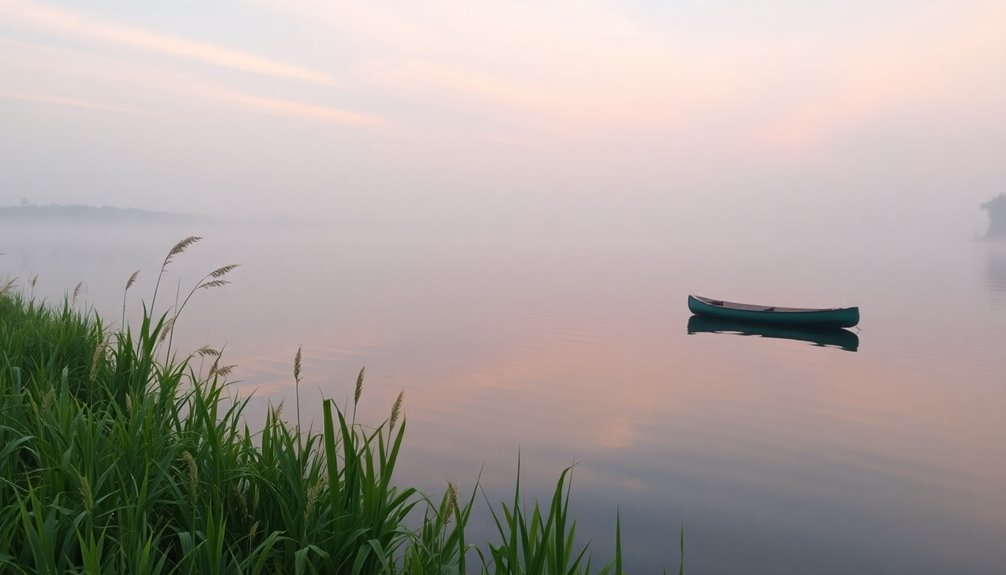
In various scenarios, lakes can exhibit a range of scents influenced by their surroundings and seasonal changes. After rain, you might notice a distinct earthy aroma, as petrichor mingles with decaying organic materials nearby. During the fall turnover process, lakes can release a foul smell reminiscent of rotten eggs, primarily due to hydrogen sulfide gas escaping from anoxic conditions in the deeper layers.
If you visit a shallow lake like Lake Granger, you'll likely encounter a fresher scent, as these water bodies don't often develop the strong odors associated with deeper, stratified lakes. In contrast, stagnant waters with rising temperatures in late summer can emit pronounced smells from decomposing plant matter and algae blooms. When oxygen levels drop, these odors become even more noticeable.
Additionally, if you're near urban areas or agricultural lands, you may encounter altered scents. Pollutants and runoff can introduce unwanted odors, overshadowing the natural scent profile of the lake environment. Each visit to a lake offers a unique olfactory experience shaped by these typical scenarios and environmental factors.
Emotional or Cultural Associations
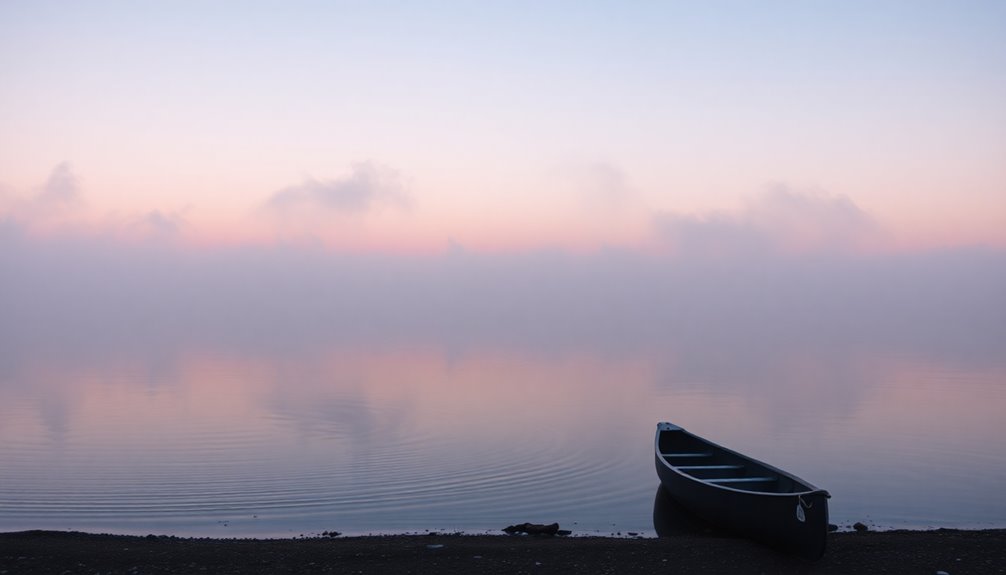
Memories tied to the scent of a lake often flood back, transporting you to sun-soaked family outings and carefree adventures in nature. That distinct smell—the earthy aroma of wet soil and the freshness of algae—can trigger vivid recollections of significant experiences and the loved ones who shared them with you. Each whiff carries a weight of nostalgia, reminding you of laughter around a campfire or quiet moments spent fishing with family.
Culturally, the scent of a lake connects you to shared traditions, from boating to communal gatherings. It becomes a collective memory that enriches your identity and strengthens bonds within your community. As the seasons change, the lake's smell signifies transitions in life, echoing the rhythms of nature and reminding you of the cycles you've experienced.
Your personal anecdotes intertwine with these olfactory experiences, shaping not just your emotional landscape but also your sense of who you are. The scent of a lake doesn't merely evoke memories; it creates a tapestry of identity, encapsulating the essence of your family heritage and the lasting impact of those cherished moments spent by the water.
Health or Safety Considerations

When it comes to enjoying a lake, being aware of health and safety considerations is crucial. During seasonal turnover, lakes can emit hydrogen sulfide, which creates a rotten egg smell. While this odor usually doesn't pose significant health risks, it can indicate changes in water chemistry that affect aquatic life. Prolonged exposure to hydrogen sulfide in enclosed spaces can lead to nausea, headaches, and fatigue, so it's best to avoid such areas.
Moreover, you should steer clear of drinking water from lakes experiencing turnover. Low oxygen levels can lead to harmful bacteria, increasing health risks associated with contamination. Awareness of these seasonal smells helps prevent unnecessary alarm and promotes understanding of natural ecological processes.
Educating yourself and others about the effects of turnover and associated odors plays a vital role in fostering public awareness and environmental stewardship. By engaging in conversations about water safety and aquatic health management, you can contribute to a healthier ecosystem. Remember, being informed not only protects your well-being but also supports the vibrant life that thrives in and around the lake.
Final Thoughts

Understanding the smells associated with lakes is essential for anyone looking to enjoy these natural wonders. The distinct odors you might encounter often stem from the lake's hypolimnion, where low oxygen levels allow for the buildup of hydrogen sulfide, especially during turnover. In the fall, when water temperatures change, the mixing of oxygen-rich surface water with colder, anoxic bottom layers can intensify these smells.
The presence of decomposing organic materials contributes significantly to the foul odors you might notice. After periods of stagnation, bacteria break down these materials, releasing gases that can make your visit less pleasant. If you experience a particularly strong smell, it may indicate rapid turnover events, influenced by wind intensity and temperature differences between layers.
Monitoring a lake's smell can provide valuable insights into its ecological health. A strong odor might signal oxygen depletion or nutrient overload, which can harm aquatic life. So, the next time you're near a lake, pay attention to its unique scents; they can reveal much about its condition and the balance of its ecosystem.
Frequently Asked Questions
What Is the Smell of Lake Water?
When you think about the smell of lake water, you might notice its earthy or musty scent, especially from organic materials. Sometimes, especially during turnover, it can smell like rotten eggs due to hydrogen sulfide gas. If there are algae blooms, you may detect a strong, unpleasant odor, too. Seasonal changes can intensify these scents, making every lake experience unique based on its surroundings and the wildlife nearby.
What Does Lake Air Smell Like?
When you breathe in lake air, you'll notice a blend of earthy freshness and subtle hints of aquatic life. Sometimes, it carries a faint fishy scent, especially during warmer months. If it's been raining, you might catch a whiff of petrichor, that lovely aroma of wet earth. On windy days, these scents get stronger, making your surroundings feel alive with nature's essence. Seasonal changes can also shift the olfactory experience, adding depth to what you smell.
What Does It Smell Like Near a Lake?
When you're near a lake, you'll notice a mix of earthy, fresh scents. The air carries the aroma of damp soil and aquatic plants. In warmer months, you might catch a musty or fishy smell from algae blooms. During fall, the scent can shift, sometimes revealing a rotten egg odor due to hydrogen sulfide gas. After rain, you'll experience petrichor, that delightful smell of wet soil and vegetation, which evokes fond memories.
What Does a River Smell Like?
When you're near a river, you might catch a fresh, earthy scent, especially after rain. This smell comes from petrichor, which happens when water hits dry soil. Depending on the area, you could notice a mix of musty aromas from decaying leaves or even industrial odors in urban settings. Warmer months might bring stronger smells from algae or decomposing plants, while aquatic life can add unique scents that signal a healthy ecosystem.
